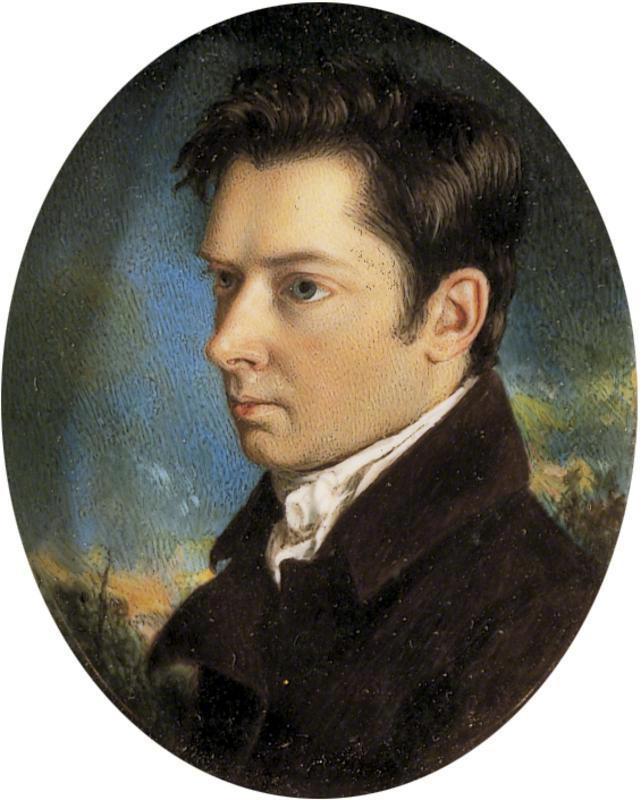William Hazlitt Berühmte Zitate
„Es ist besser, weder lesen noch schreiben zu können, als weiter nichts zu können.“
Table Talk, 1821 - 1822
William Hazlitt: Zitate auf Englisch
“We are all of us more or less the slaves of opinion.”
"On Court-Influence" (January 3/January 10, 1818)
Political Essays (1819)
“The art of will-making chiefly consists in baffling the importunity of expectation.”
"On Will-Making"
Table Talk: Essays On Men And Manners http://www.blupete.com/Literature/Essays/TableHazIV.htm (1821-1822)
“Those who can command themselves, command others.”
No. 407
Characteristics, in the manner of Rochefoucauld's Maxims (1823)
No. 43
Characteristics, in the manner of Rochefoucauld's Maxims (1823)
"Edmund Burke"
The Eloquence of the British Senate (1808)
“Some persons make promises for the pleasure of breaking them.”
No. 413
Characteristics, in the manner of Rochefoucauld's Maxims (1823)
"William Gifford" http://en.wikisource.org/wiki/The_Spirit_of_the_Age/Mr._Gifford
The Spirit of the Age (1825)
"On the Ignorance of the Learned"
Table Talk: Essays On Men And Manners http://www.blupete.com/Literature/Essays/TableHazIV.htm (1821-1822)
“There are names written in her immortal scroll, at which FAME blushes!”
No. 53
Characteristics, in the manner of Rochefoucauld's Maxims (1823)
No. 364
Characteristics, in the manner of Rochefoucauld's Maxims (1823)
Lectures on the English Poets http://www.gutenberg.org/files/16209/16209.txt (1818), Lecture VIII, "On the Living Poets"
“The player envies only the player, the poet envies only the poet.”
"On Envy"
The Plain Speaker (1826)
"On Wit and Humour"
Lectures on the English Comic Writers (1819)
"On the Ignorance of the Learned"
Table Talk: Essays On Men And Manners http://www.blupete.com/Literature/Essays/TableHazIV.htm (1821-1822)
"On Cant and Hypocrisy"
Men and Manners: Sketches and Essays (1852)
" On a Sun-Dial http://www.blupete.com/Literature/Essays/Hazlitt/Sundial.htm" (New Monthly Magazine, October 1827)
Men and Manners: Sketches and Essays (1852)
"Why Distant Objects Please"
Table Talk: Essays On Men And Manners http://www.blupete.com/Literature/Essays/TableHazIV.htm (1821-1822)
"On the Knowledge of Character"
Table Talk: Essays On Men And Manners http://www.blupete.com/Literature/Essays/TableHazIV.htm (1821-1822)
No. 191
Characteristics, in the manner of Rochefoucauld's Maxims (1823)
Review of Lord Byron's Childe Harold in Yellow Dwarf (2 May 1818), reprinted in The Collected Works of William Hazlitt, ed. A.R. Waller and Arnold Glover (1902-1904)
“They are the only honest hypocrites. Their life is a voluntary dream; a studied madness.”
" On Actors and Acting" http://www.blupete.com/Literature/Essays/Hazlitt/RoundTable/ActorsActing.htm (The Examiner, 5 January 1817)
The Round Table (1815-1817)
“The more we do, the more we can do; the more busy we are, the more leisure we have.”
"Mr. Brougham — Sir F. Burdett" http://en.wikisource.org/wiki/The_Spirit_of_the_Age/Mr._Brougham-Sir_F._Burdett
The Spirit of the Age (1825)
" On the Clerical Character http://www.blupete.com/Literature/Essays/Hazlitt/Political/ClericalCharacter.htm" (January/February 1818)
Political Essays (1819)
“The public have neither shame or gratitude.”
No. 85
Characteristics, in the manner of Rochefoucauld's Maxims (1823)
"On Criticism"
Table Talk: Essays On Men And Manners http://www.blupete.com/Literature/Essays/TableHazIV.htm (1821-1822)
“Good temper is an estate for life…”
" On Personal Character http://www.blupete.com/Literature/Essays/Hazlitt/PersCharacter.htm" (1821)
The Plain Speaker (1826)
“If mankind had wished for what is right, they might have had it long ago.”
"On the Pleasure of Hating"
The Plain Speaker (1826)
and on receiving an answer in the negative, have nothing further to say.
"On Coffee-House Politicians"
Table Talk: Essays On Men And Manners http://www.blupete.com/Literature/Essays/TableHazIV.htm (1821-1822)
"On the Fear of Death"
Table Talk: Essays On Men And Manners http://www.blupete.com/Literature/Essays/TableHazIV.htm (1821-1822)
